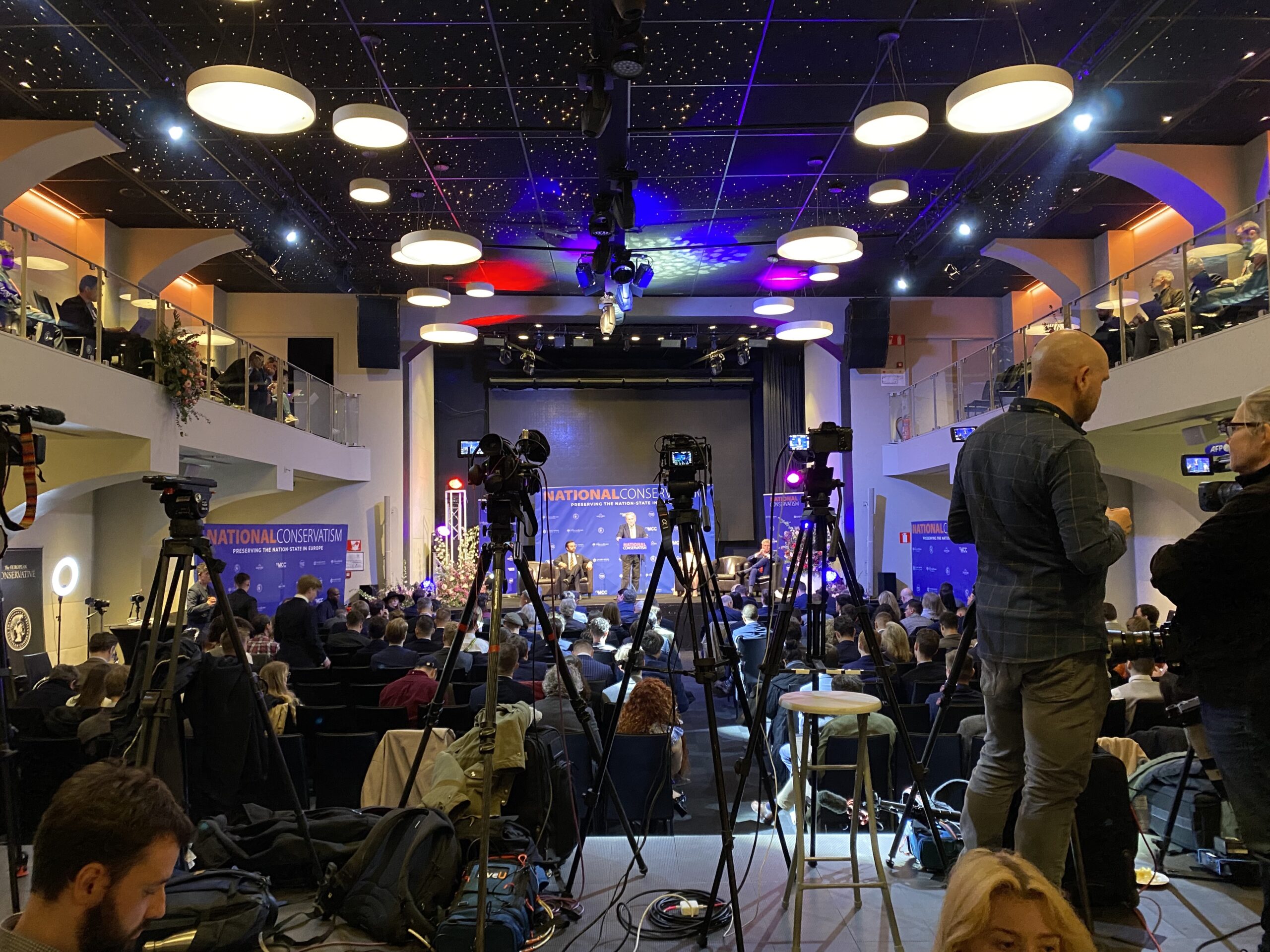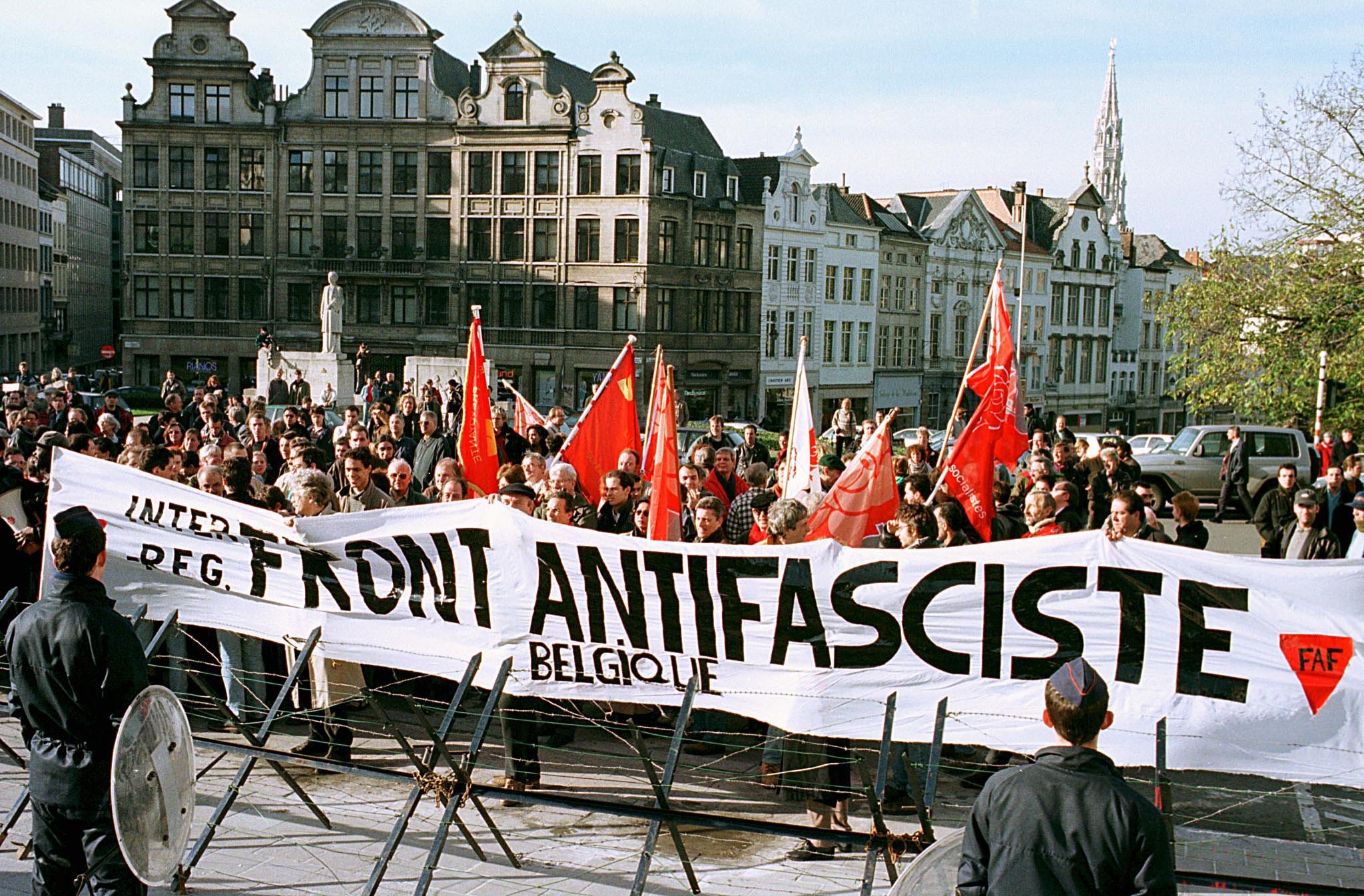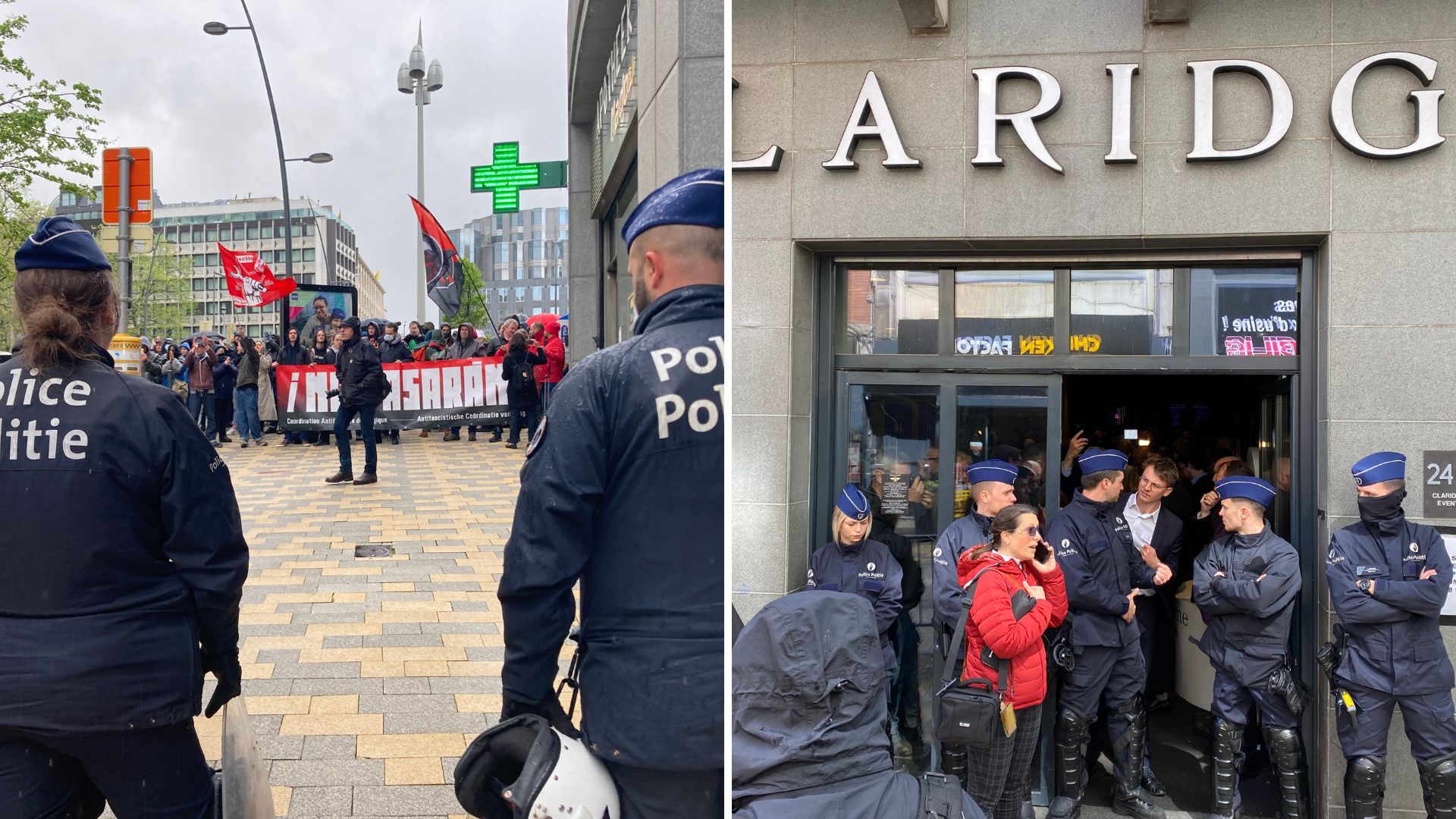The Belgian Antifascist Coordination (CAB) has hit back at criticisms that its mobilisation against the controversial far-right National Conservatism Conference (NatCon) was an assault on freedom of speech.
After days of farcical cat-and-mouse between organisers and Brussels authorities, the not-really-banned NatCon ended on Wednesday night as planned, amid a consensus that the attempt to ban or disrupt the conference was anti-democratic. The event saw advocates of Brexit, Netanyahu, Orbàn, Vlaams Belang, and PiS, attack the European Union, the left, liberals, Islam and traditional conservatives in speeches replete with sweeping generalisations.
In the process, dominant political movements of the post-Second World War were invoked as antifascist activists clashed with claimants to free speech. Speakers promoted a return to a nationalist Europe – a continent of municipalities each vying for their own interests and influence.
"We pointed out that despite electoral gains, far-right policies remain a mortal danger for large swathes of the population," reads the statement from the Belgian Antifascist Coordination (CAB). "We therefore have a legitimate right to defend ourselves and to organise actively against them."
One Belgian political expert told The Brussels Times that antifascist tactics in Belgium and elsewhere aim to protect democracy. However, most of the far-right speakers at NatCon advocated rolling back universal human rights and instead organising society according to racial, ethnic, gender and social divisions, as seen in Britain, Italy, Hungary and Poland (up until the 2023 election).

National Conservative Conference 2024 in Brussels. Credit: The Brussels Times
One by one, speakers at the Claridge Events hall held up social progress as an excuse to fabricate oppressive and authoritarian fantasies. Many presented the EU as a "one-party state" led by "totalitarian forces". One Spanish MEP from Vox argued that EU orchestrates "mass migration", "woke ideology" and "climate madness" – ideas common in addresses by Russian President Vladimir Putin.
Alexander De Croo's intervention on Tuesday (under pressure from far-right Italian Prime Minister Giorgia Meloni) added weight to the notion that the right to free speech and peaceful assembly was under attack. However the Belgian Prime Minister had remained quiet during the previous two venue cancellations, including with liberal mayor of Etterbeek, Vincent de Wolf (MR).
In a comment to The Brussels Times, John O’Brien (a co-organiser from the Orbán-linked think tank MCC) described the cancellation order issued on Tuesday by Saint-Josse mayor Emir Kir – where the NatCon event was held – as "Orwellian". Meanwhile the far-right had a media field day as they presented themselves as victims defending freedom of speech.

Nigel Farage enjoying himself with the press. Credit: The Brussels Times
Yet despite the mayor's banning order, the conference was allowed to proceed as normal, only behind closed doors (although it was a ticketed event). This was before the Council of State ruled late on Tuesday night that the second day could go ahead.
"It takes great audacity for the worst authoritarians to hide behind freedom of speech when their entire political project is based on repression and prohibition," the CAB statement read. "We asserted loud and clear what had been said after the Second World War and which many people seem to have forgotten: Never again!"
Powerful antifascist movement in Belgium
Largely overlooked in the media furore was the active culture of antifascist activism in Belgium, especially within the francophone community. "It's something that we regularly see French-speaking antifascists doing," said Benjamin Biard, a political expert at the Belgian Center for Sociopolitical Research and Information (CRISP), in an interview with The Brussels Times.
"The aim is to prevent such politics from taking place at all costs, so that on the one hand they can't be considered as normal parties like the others but on the other hand to put obstacles in their way and prevent their ability to develop and structure themselves."
Just last month, a one-day conference at the Hotel Sofitel in Etterbeek (the same one which cancelled on Monday) had been scheduled by the European Parliament group, Identity & Democracy (ID), and by German far-right party AfD. Belgian antifascist pressure also saw this event cancelled.
Biard explains that this type of action is not uncommon: "We’ve seen it in Wallonia on several occasions in recent years, again against the party." The fringe far-right Chez Nous party in Wallonia has often been prevented from holding discussions or meetings because of antifascist activism and the actions of local mayors, who come under pressure from the antifascists.
"What happens is that the anti-fascists contact the mayor, and the municipal administration, telling them that there's a meeting taking place on the territory of the municipality, that they can hear it against demonstrating," Biard continued. "Typically, the mayors then impose a banning order because of the risk of disturbing public order."
This threat to public order tends to lead to bans, which are then criticised by the far-right, Biard explained. He stressed that many municipalities have in place anti-fascist motions that actively prevent extreme right-wing events. This is especially true in Wallonia, though Biard was not sure if it is the case in Saint-Josse.
'Safari walks'
This was not the first instance of a far-right event organised in Saint-Josse. Last year mayor Emir Kir had previously banned a Vlaams Belang-organised "safari walk" in the multicultural municipality (which is also Belgium's smallest and poorest). Organisers had invited the convicted conspiracy theorist Renaud Camus.
In 2022, the mayors of Saint-Josse, Molenbeek and Schaerbeek prevented a similar "walk" in their municipalities. This would have seen Vlaams Belang politician Filip Dewinter walk with Geert Wilders, the far-right leader of the Dutch Party for Freedom (PVV) and winner of the last Dutch elections.

Vlaams Belang's Filip Dewinter, Dutch far-right politician Geert Wilders and Vlaams Belang's Sam Van Rooy pictured taking an alternative route after being banned by three municipalities by Belgian Vlaams Belang politician Dewinter and Dutch politician Wilders (PVV) in Brussels, Friday 13 May 2022. Credit: Belga / Eric Lalmand
The walks were designed to "illustrate" the great replacement theory – a well-known far-right conspiracy theory also proliferated by Camus, who has several convictions in France for inciting hatred or violence.
However, Biard does not believe there was an electoral calculation in Kir’s actions to ban the conference – a view not shared by the CAB, who called out the mayor’s association with the Turkish far-right. This saw Kir excluded from the Socialist Party (PS) in 2020.
Cordon sanitaire and democracy
So why were things different on Tuesday? For Biard, much came down to optics, given the wide media focus on the conference: "A whole series of representatives of the European far-right were present in Brussels, either already in the room or – like Eric Zemmour – on the pavement, refused entry into the building."
The political expert rejected that the cordon sanitaire against the far-right in Belgium played a significant part in the cancellation of the NatCons event. He explained that this is more of a media and political concept in Belgium developed after the Second World War to prevent the far-right from coming to power by excluding them from political alliances or media platforms.

Members of the Antifascism Front demonstrating in Brussels against a Vlaams Blok (Vlaams Belang's predecessor) meeting in 1997. Credit: Belga
NatCon did, however, illustrate the powerful mobilisation capabilities of Belgian social movements against the far-right – which is seen by many here as the ultimate defence of democracy. "In the end, the [NatCon] event shows that civil society is organised and mobilised in the face of the far-right and that it is particularly strong," Biard stated.
"Whilst this might be considered an obstacle to freedoms of association and expression that are enshrined in the Constitution, it can also be seen as means of preserving democracy," he concluded.
And these are not new concepts. English philosopher and politician John Stuart Mill, one of the godfathers of classic liberalism, wrote in his On Liberty essay: "The sole end for which mankind are warranted, individually or collectively, in interfering with the liberty of action of any of their number, is self-protection."

